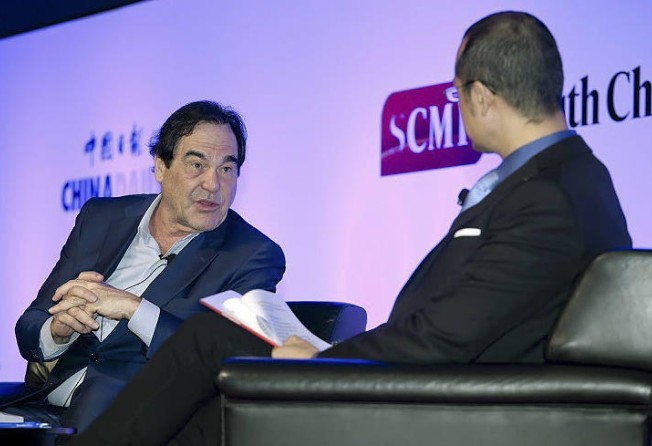Getting to know what drives award-winning US film director Oliver Stone

"I'm not a fan waiting for his autograph," I snap at the Secret Service-type security manager when he informs me I can't wait in the VIP room backstage for Oliver Stone because the great director won't like it if "all kinds of people" are milling about the place when he arrives.
There's half an hour to go before I have a one-on-one talk with Stone on stage at the World Business Forum, where I've just finished moderating for another speaker who had no such backstage qualms.
I return when I'm told Stone has arrived and find him with his back to me, inspecting the snacks, coffee and tea laid out for him. I make a move to introduce myself but find my way blocked by his small army of minders who use facial expressions, gestures and whispers to inform me it's not a good idea to disturb him at such a crucial moment.
This is going to be a long day, I think to myself. Stone turns around and asks for me by name, deducing my Tibetan background and asking about my little Himalayan hometown. He tells me he has a deep interest in Buddhism, and my reservations about Hollywood prima donnas melt away as we chat.
Stone is as accommodating as he is intimidating, overruling all the restrictions imposed on me by his PR team. Of course we can talk about his latest movie on NSA whistleblower Edward Snowden, of course I can open up the discussion to audience questions, never mind what his PR assistants had earlier told me.
"We'll follow Yonden, we'll just do it his way," he tells them.
There's something about self-made men who have really had to struggle to make it, and Stone exudes the quiet confidence that comes with it. He is very matter-of-fact, opinionated without being overbearing, and genuinely modest about his achievements.
The 68-year-old director of acclaimed films such as Platoon, Wall Street, Natural Born Killers and Nixon has done it all, from dropping out of university to working as a taxi driver and fighting in the Vietnam war, before breaking into Hollywood as a scriptwriter in the late 1970s and eventually establishing himself as one of the world's most respected filmmakers.
"I was young, I was hungry, I was intense," he recalls as he chats about the constant rejection he faced from studios when trying to make the Oscar-winning Platoon.
Even now, after all the success, it can still be a struggle, he explains, and he sometimes wonders if it's worth it.
On stage, Stone is as passionate about his craft as he is about exposing injustices in the world, especially where his country is involved. He is fiercely critical of America's hegemonistic agenda, but sounds more sad than angry about the direction his country is heading in.
His interest in Buddhism is clear as he talks about "cause and effect", "clean conscience" and "the power of communication and compassion".
He describes himself as a "dramatist" above all, not an activist, despite a portfolio that features such works as South of the Border, his documentary on progressive Latin American leaders vilified by the United States government.
He is quite sporting when I ask him what happened with Alexander, his epic film on the legendary Greek conquerer, which was savaged by American critics, although it went on to gross more than US$167 million worldwide.
When I tell him it's the only film of his that I didn't like, he explains it was not what he wanted his audience to see, and how he spent nearly a decade putting together the "completely different" version, released in 2013 as the "Ultimate Cut".
"Please watch that first and then let me know what you think," Stone tells me. "Send me an email."
I forget to ask him for his email address.